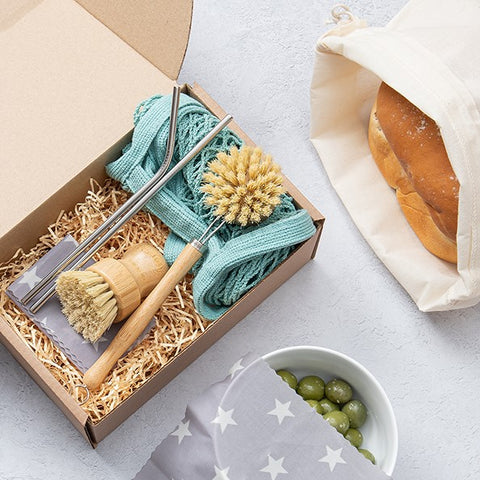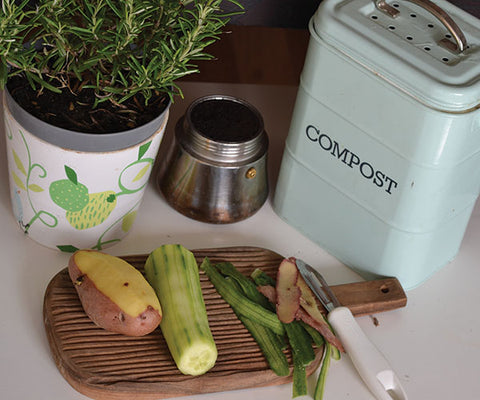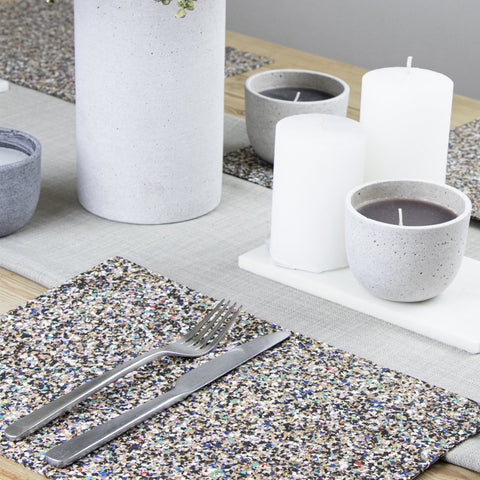
Eco Friendly Living: A Guide to Getting Started
If you’re looking to get started with an eco friendly lifestyle, then you’ve come to the right place! With so much information out there, it might feel a bit overwhelming to know how to begin. We’re here to help. Whether you want to start using eco friendly products, or simply learn how to cut down waste, then keep reading for lots of ideas and all of our top tips…
You’ve arrived at this page because you want to do the right thing, but it’s so difficult to know what that actually is! In reality, there isn’t a single solution that ticks every box. We’ll outline some of things you can do to get started below, however, the most important thing is simply to start doing something. If lots of people make small changes to their lifestyles, then it all adds up to a much bigger impact.
What is Eco-Friendly Living?
In a nutshell, eco-friendly living is a way of life that focuses on reducing energy consumption, minimising waste and using sustainable materials. This may sound like a big lifestyle change, but there are lots of simple things you can do to get started on the journey.
Remember, these are habits you want to continue to live by, so it’s important that they’re achievable. Otherwise, you risk reverting back to old habits or being put-off altogether. Because let’s face it, we all lead hectic lives with family and work commitments.
First of all, let’s remind ourselves why you might want to get started with eco-friendly living in the first place.
The Benefits of Eco-Friendly Living
1. Environmental Impact
This is the biggie! One of the primary reasons to embrace eco-friendly living is the positive impact it can have on the environment. By reducing your carbon footprint, conserving resources, and reducing waste, you can help to protect our planet for future generations.
We all want our children and grandchildren to grow up happy and healthy in the world around them. Not to mention of course the huge diversity of flora and fauna with whom we share our fragile planet.
2. Personal Health
Living an eco-friendly lifestyle can also have benefits for your personal health. By reducing your exposure to toxic chemicals and pollutants, you can lower your risk of health problems such as respiratory issues. Poor air quality and plastic pollution are big issues. The cleaner our environment, then the better it is for us all.
3. Financial SavingsEco-friendly living can also be cost-effective in the long run. By reducing your energy and water usage, choosing reusable over disposable products, and making smarter purchasing decisions, you can save money on your bills and reduce your overall expenses. Have a read of our article on how to be eco-friendly on a budget for more inspiration!
4. Social ResponsibilityTaking steps to live a more eco-friendly lifestyle is also a way of fulfilling your social responsibility to the planet and the people who live on it. By choosing sustainable products, supporting ethical companies, and reducing your waste, you can make a positive impact on the world around you. Many of the eco friendly products we stock here at Pasoluna are also created by social enterprises around the world. Be sure to read the bio’s for each of our brands to find out more.

So we know what eco-friendly living is all about, and why it’s important, but how do we actually get started? Let’s dive in. First on the list is reducing our energy consumption.
How to Start Eco Friendly Living
1. Reduce Energy Consumption
The good news is, the more you cut down on energy use at home, the more you save on your bills. Saving energy and saving money go hand in hand. It’s better for the environment and better for your pocket. That sounds like a win-win solution to us!
If your first thoughts about saving energy involve installing solar panels, then that’s great, but there are lots of smaller things you could do first. For instance, did you know that you could save £125 a year just by draught-proofing your doors and windows? By keeping the heat in, you’re reducing the amount of energy needed to keep the room warm.
Another option is to use a programmable or smart thermostat that will allow you to adjust temperature settings remotely from anywhere with internet access. That way you can ensure you only have the heating on for as long as necessary, and you’re not restricted to a set schedule.
A really quick win is to switch to LED light bulbs and choose energy efficient appliances when it’s time to replace them. Likewise, make sure everything is switched off when not in use. This includes turning off lights when you’re not in the room, but also turning off appliances at the socket too. You’d be surprised how much you can save when your electricals aren’t on standby.
We Brits love a good cuppa, but you can save energy by only filling the kettle up as much as you need. Think how many cups of tea you drink in a day and how much energy you can save this way. Everything helps!
There’s lots in the news at the moment about electric cars, and it’s certainly worth considering as an option if you’re planning to purchase a new one. Even if that’s not the right solution for you right now, then make sure you research cars with the best fuel efficiency for your budget.
Lastly, if you’re looking to reduce your overall environmental footprint, consider reducing the amount of meat you eat. If going vegan isn’t very appealing, consider swapping out meat from one or two meals a week.
In summary a few quick wins to reduce energy consumption at home include:
- Reduce energy from your boiler by blocking draughts, using a smart thermostat and turning the heat down a degree or two.
- Switch to LED lightbulbs.
- Choose energy efficient appliances when you come to replace them.
- Switch off lights and electricals when not in use, including those on standby.
- Don’t overfill the kettle.
- Choose a car with good fuel efficiency.
- Swapping out meat from a meal or two in the week.
2. Minimise Waste
Another important aspect of eco-friendly living involves reducing waste. It’s important because when waste is sent to landfills or incinerators, it can contribute to air, water, and soil pollution. Likewise, every time we create something new, the production and transport of these items requires energy. By reducing waste, we can reduce the amount of items created and therefore the energy that’s used to produce and transport them.
A simple way to get started is to choose reusable over disposable. Taking a reusable shopping bag with you to the supermarket is now pretty common, just make sure you’ve always got one to hand! If you’re a coffee lover, then keep a reusable travel cup with you in your car, handbag or on your desk at work. Not only will this reduce the production of disposable cups, but will help with reducing waste too. You might be surprised to learn that even though they’re made of paper, they’re not actually recyclable.
Plastic bottles are one of the biggest sources of pollution on our planet right now; they take hundreds of years before breaking down into smaller pieces called microplastics which pollute our oceans when washed out into rivers during heavy rains or floods - or simply discarded by humans directly into waterways where they end up being eaten by fish who then pass them up through food chains until eventually ending up back on our dinner plates again. Aim to use a refillable bottle where you can.
Recycling and composting are two of the most important ways to reduce your waste. Recycling is easy - you can just put your plastic, glass and metal containers in the appropriate bins at home or work. What exactly you can recycle varies from council to council, so be sure to check the rules where you live.
Composting is also simple: just add food scraps to a bin with soil or sawdust and let nature take its course. This helps to make sure they don't end up in landfills where they'll take decades - if not centuries - to decompose. Even natural food scraps like banana peels can take a very long time to decompose in landfill due to the particular conditions required for the decomposition process.

Being organised is actually a great way to reduce waste too. If you create a meal plan and shopping list for the week, then that cuts down on the amount of potential food waste. How often have you binned a bag of salad because it’s not been used?
On the subject of shopping, consider buying things in bulk when possible. This will reduce packaging waste because everything comes in one big bag instead of multiple small ones (and hopefully it comes with reusable containers). Zero waste stores are created for exactly this purpose.
For most of us, going zero waste is a journey rather than a destination. It doesn’t have to mean lots of sacrifices either. Have a read of our article on going zero waste for zero effort for more ideas.
3. Choose Sustainable Materials
The third way to get started with eco-friendly living is to choose sustainable materials when making purchases.
- Recycled materials: This covers lots of different materials, from plastics to metals, glass and cotton. Not only should we do our bit by recycling old items into new ones rather than throwing them away, it helps to choose recycled products when buying new too. Glass can be recycled infinitely, and recycled plastics are becoming more and more common in everything from homewares to fashion.
- Bamboo: Bamboo is a sustainable material that's been used for centuries. It grows quickly, requires minimal water and fertiliser, and can be harvested without damaging its root system. Plus, it's strong enough to be used as an alternative to wood in many applications.
- Organic cotton: When you buy organic cotton clothing or bedding, you're supporting farmers who grow their crops without pesticides or fertilisers (and their workers aren't exposed to these harmful chemicals). This means they're less likely to pollute nearby waterways with runoff from their fields. Look out for the GOTS certification to be confident that the item has been produced in this way.
- Plastic free: Regular plastics use oil in production, which is a finite resource and contributes to greenhouse emissions when sent to landfill or incinerators. Choosing plastic free products made from natural, biodegradable materials like wood, wool and cork also reduces waste when you come to dispose of them. Cork is a particularly good eco-friendly material as it can be harvested without damaging the tree.

Whilst we’ve outlined some of our top tips around energy consumption, reducing waste and using sustainable materials, there are a few other things we couldn’t leave off the list! These are simple things that will help the environment in everyday life
- Transport choices - try carpooling to work, biking, walking or using public transport where you can.
- Conserve water - take a shower instead of a bath, collect rainwater to use in the garden and fix that leaky tap!
- Shop sustainably - avoid products in plastic packaging and look out for certifications so you can be confident that raw materials have been sustainably sourced. Buy local where you can and choose companies that share your environmental and social goals.
The mantra Reduce, Reuse, Recycle is really central to environmentally friendly living. We hope to have shown you how this doesn’t have to mean big lifestyle changes, and there are lots of ways to incorporate it easily into everyday life.
Overall, living an eco-friendly lifestyle is a great way to promote sustainability, protect the environment, and create a healthier, more sustainable world for ourselves and future generations. We hope you’ve found our guide useful!


Leave a comment
This site is protected by hCaptcha and the hCaptcha Privacy Policy and Terms of Service apply.